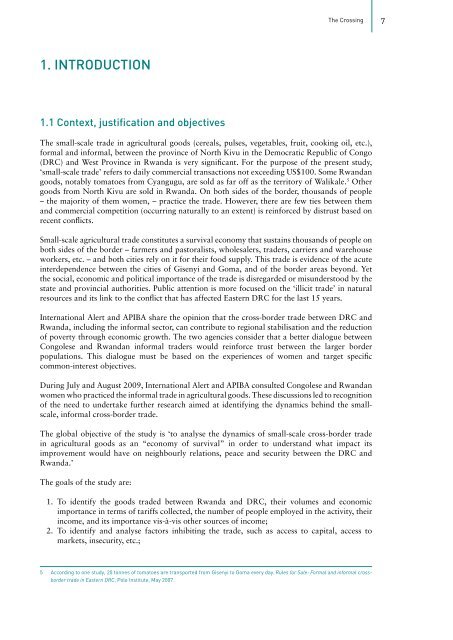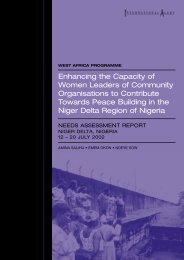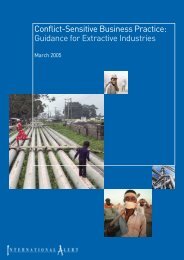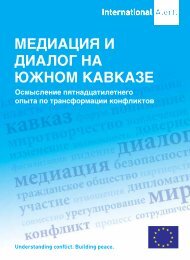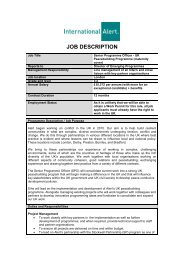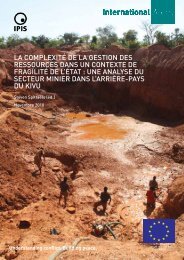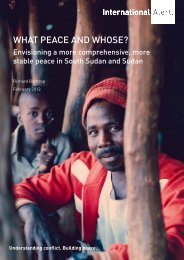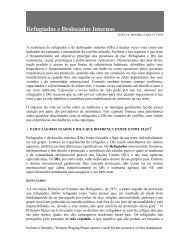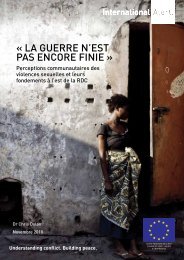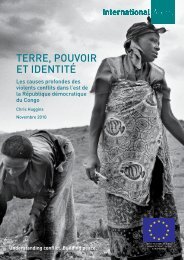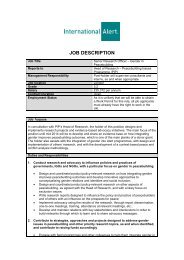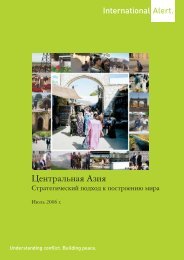The crossing English Version - International Alert
The crossing English Version - International Alert
The crossing English Version - International Alert
- No tags were found...
Create successful ePaper yourself
Turn your PDF publications into a flip-book with our unique Google optimized e-Paper software.
<strong>The</strong> Crossing71. INTRODUCTION1.1 Context, justification and objectives<strong>The</strong> small-scale trade in agricultural goods (cereals, pulses, vegetables, fruit, cooking oil, etc.),formal and informal, between the province of North Kivu in the Democratic Republic of Congo(DRC) and West Province in Rwanda is very significant. For the purpose of the present study,‘small-scale trade’ refers to daily commercial transactions not exceeding US$100. Some Rwandangoods, notably tomatoes from Cyangugu, are sold as far off as the territory of Walikale. 5 Othergoods from North Kivu are sold in Rwanda. On both sides of the border, thousands of people– the majority of them women, – practice the trade. However, there are few ties between themand commercial competition (occurring naturally to an extent) is reinforced by distrust based onrecent conflicts.Small-scale agricultural trade constitutes a survival economy that sustains thousands of people onboth sides of the border – farmers and pastoralists, wholesalers, traders, carriers and warehouseworkers, etc. – and both cities rely on it for their food supply. This trade is evidence of the acuteinterdependence between the cities of Gisenyi and Goma, and of the border areas beyond. Yetthe social, economic and political importance of the trade is disregarded or misunderstood by thestate and provincial authorities. Public attention is more focused on the ‘illicit trade’ in naturalresources and its link to the conflict that has affected Eastern DRC for the last 15 years.<strong>International</strong> <strong>Alert</strong> and APIBA share the opinion that the cross-border trade between DRC andRwanda, including the informal sector, can contribute to regional stabilisation and the reductionof poverty through economic growth. <strong>The</strong> two agencies consider that a better dialogue betweenCongolese and Rwandan informal traders would reinforce trust between the larger borderpopulations. This dialogue must be based on the experiences of women and target specificcommon-interest objectives.During July and August 2009, <strong>International</strong> <strong>Alert</strong> and APIBA consulted Congolese and Rwandanwomen who practiced the informal trade in agricultural goods. <strong>The</strong>se discussions led to recognitionof the need to undertake further research aimed at identifying the dynamics behind the smallscale,informal cross-border trade.<strong>The</strong> global objective of the study is ‘to analyse the dynamics of small-scale cross-border tradein agricultural goods as an “economy of survival” in order to understand what impact itsimprovement would have on neighbourly relations, peace and security between the DRC andRwanda.’<strong>The</strong> goals of the study are:1. To identify the goods traded between Rwanda and DRC, their volumes and economicimportance in terms of tariffs collected, the number of people employed in the activity, theirincome, and its importance vis-à-vis other sources of income;2. To identify and analyse factors inhibiting the trade, such as access to capital, access tomarkets, insecurity, etc.;5 According to one study, 20 tonnes of tomatoes are transported from Gisenyi to Goma every day. Rules for Sale: Formal and informal crossbordertrade in Eastern DRC, Pole Institute, May 2007.


